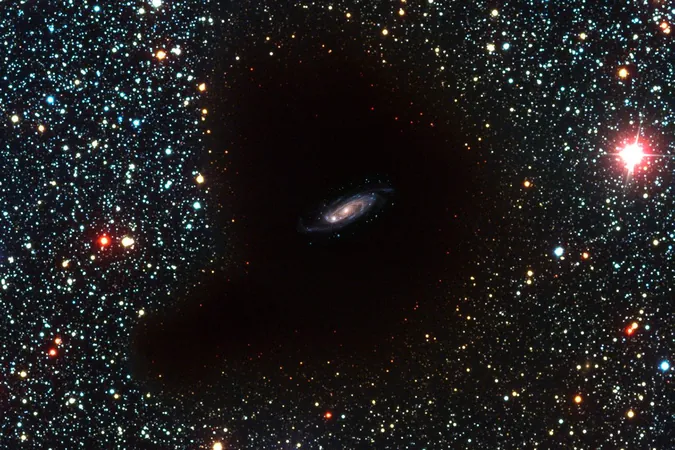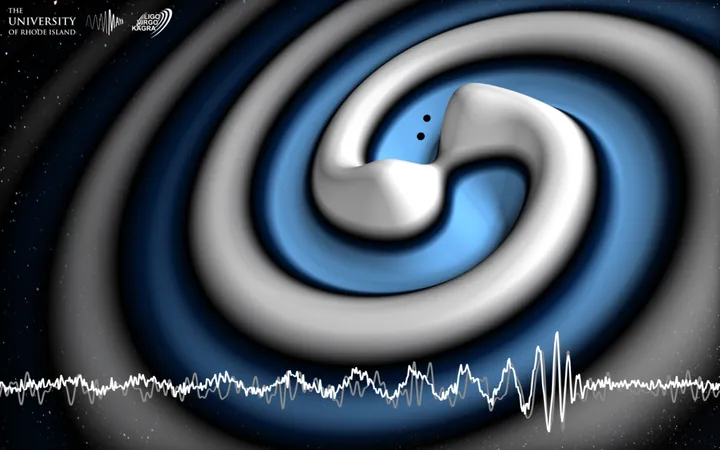
Could Earth Be Floating in a Cosmic Void? Shocking Discovery by Scientists!
2025-07-09
Author: Wei
Unlocking the Mysteries of Our Universe!
Imagine this: Earth and the entire Milky Way might be suspended in a staggering cosmic void stretching a billion light-years wide! This bold theory emerges from groundbreaking research that examines the echoes left by the 'soundwaves' of the Big Bang.
Astronomers are uncovering astonishing implications about our cosmic neighborhood, suggesting it may be far emptier than we ever imagined.
The Hubble Tension Dilemma
One of the most compelling aspects of this theory is its potential to solve the notorious Hubble Tension. This conundrum arises from conflicting measurements of how quickly our Universe is expanding. When astronomers gauge it from the distant outskirts, they find a slower rate compared to measurements taken closer to home.
Dr. Indranil Banik from the University of Portsmouth states, 'A potential solution to this inconsistency is that our Galaxy is near the center of a large, local void.' This could explain why the expansion appears accelerated locally, as gravitational forces from surrounding regions pull galaxies towards the void's edges.
What Does It Mean for Us?
If this void theory holds, it could reshape our understanding of cosmic dynamics. A void of such massive proportions, with a galaxy density 20% lower than average, would create an illusion of rapid expansion in our corner of the Universe. As galaxies inside the void drift outward, they would seem to be fleeing from us faster than they actually are.
Could life in the void be influencing our astronomical observations? The idea isn’t entirely new; astronomers have speculated about cosmic voids for some time. Yet, determining their existence from within poses a daunting challenge, akin to figuring out your home's layout while trapped in a single room.
Evidence from the Echoes of the Big Bang
Banik's research team dug deep, analyzing baryon acoustic oscillations (BAOs)—the ripples left behind by pressure waves from the Big Bang. Over billions of years, these oscillations have shaped cosmic structures. Their patterns might be distorted if we are indeed nestled inside a void.
The team spent 20 years gathering evidence, and their findings suggest that a local void could explain our observations.
The Future of Cosmic Exploration
While this groundbreaking theory has the potential to transform our understanding of the Universe, further investigation is needed. Scientists will delve into how living in a void affects cosmic behavior. Could it be our corner of the Universe is lonelier than we thought? Only time—and more research—will tell!


 Brasil (PT)
Brasil (PT)
 Canada (EN)
Canada (EN)
 Chile (ES)
Chile (ES)
 Česko (CS)
Česko (CS)
 대한민국 (KO)
대한민국 (KO)
 España (ES)
España (ES)
 France (FR)
France (FR)
 Hong Kong (EN)
Hong Kong (EN)
 Italia (IT)
Italia (IT)
 日本 (JA)
日本 (JA)
 Magyarország (HU)
Magyarország (HU)
 Norge (NO)
Norge (NO)
 Polska (PL)
Polska (PL)
 Schweiz (DE)
Schweiz (DE)
 Singapore (EN)
Singapore (EN)
 Sverige (SV)
Sverige (SV)
 Suomi (FI)
Suomi (FI)
 Türkiye (TR)
Türkiye (TR)
 الإمارات العربية المتحدة (AR)
الإمارات العربية المتحدة (AR)